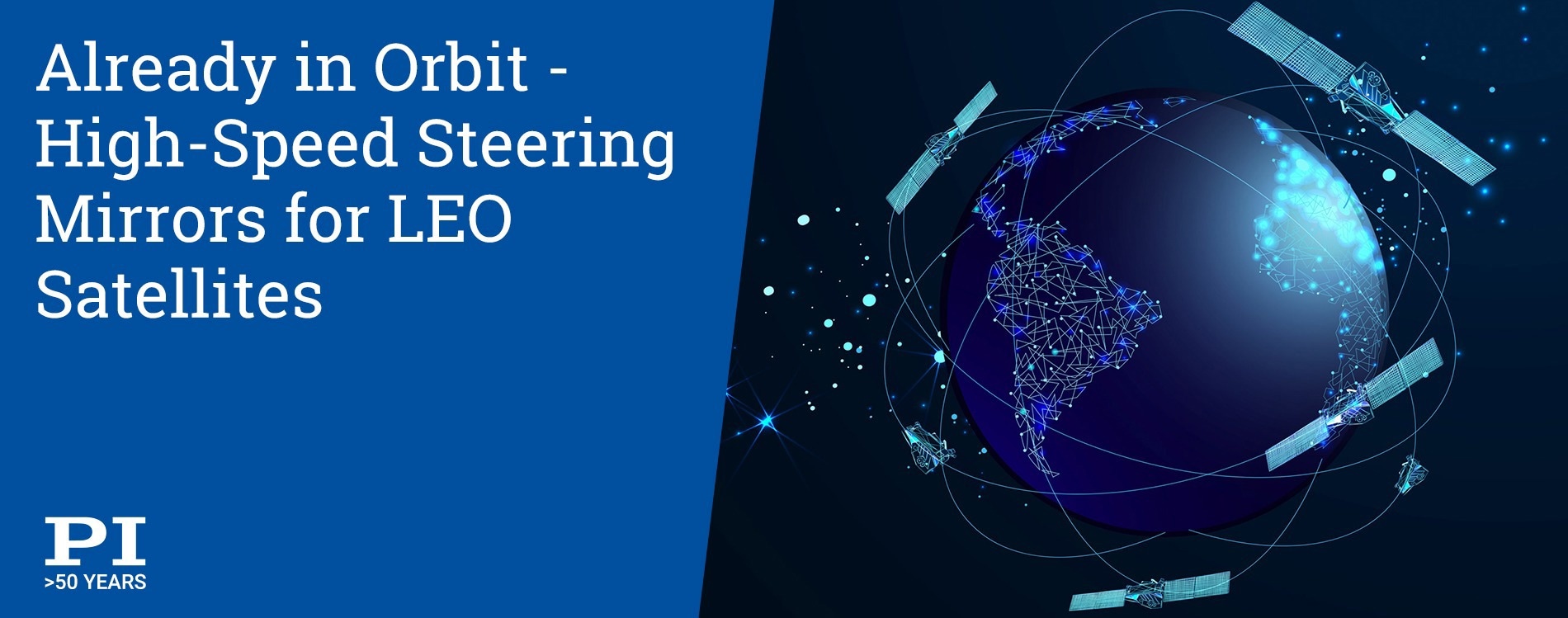Auburn, MA – Tip/tilt mirrors for beam stabilization are essential subsystems for free-space optical communication networks. With the rapid development of LEO (Low Earth Orbit) satellite networks, the need for such subsystems is growing rapidly. Tip/tilt mirrors from Physik Instrumente (PI) have already proven their space qualification on several occasions. Now, they are proving their value in various satellite networks. Both piezo-based and electromagnetic series systems and operator-specific system solutions from PI meet the necessary technical and economic specifications.

Image Credit: PI (Physik Instrumente) LP
Global Internet access is one of the most important prerequisites for economic prosperity and security. However, in many regions of the world, building fiber optic and 5G networks is not profitable. LEO networks offer a solution to this: Several operators are currently building such communication networks, each with many thousands of satellites. Here, the latest generation uses laser-based free-space optical communication (FSOC). This technology offers high bandwidth and can support an ever-increasing number of users.
Beam Stabilization Systems Enable Permanently Error-Free Data Transmission
Beam stabilization systems are one of the prerequisites for error-free data transfer via FSOC networks. In order for laser beams to maintain a reliable and permanent connection to the receiving dishes of satellites at great distances, vibrations and drift, for example, must be compensated for in a highly dynamic manner. Tip/tilt mirrors, also known as fast steering mirrors (FSM), make this possible. Over decades, the PI Group has produced customized tip/tilt mirrors for space missions such as the Solar Orbiter, which has been on its way to the sun since 2020. However, LEO communication satellites are much smaller, often weighing less than 500 kg. All subsystems must be compact and, at the same time, cost-effective, which is only possible if they are produced in large quantities. In addition to the actual functionality of beam stabilization, the subsystems must withstand the accelerations during rocket launches as well as high temperature fluctuations and radiation exposure in space. Reliability must be absolute. Beyond its decades of experience in LEO and deep-space mechanism, PI draws on its pioneering experience in silicon photonics manufacturing, where its proprietary technology has enabled processes requiring similarly stringent, mission-critical tracking and compensation functionality.
Space Qualification Proven – Series Production Initiated
In simulation runs in 2020, COTS steering systems such as PI's piezo-based S-331 tip/tilt platforms have proven their suitability for use in space in accordance with NASA GEVS (General Environmental Verification Standard). They generate highly dynamic and wear-free movements with a tip/tilt angle of up to 5 mrad (corresponding to up to 10 mrad or 0.57° deflection) and a resolution of 0.1 µrad for beam stabilization. Pioneering LEO network operators have successfully deployed PI FSMs in their communication satellites and have confirmed their unrestricted suitability for use in space. For other operators, PI engineers have developed electromagnetically driven tip/tilt mirror systems (voice coil FSMs) for larger deflections. To manufacture them, the company in Karlsruhe, Germany, has invested in a highly automated production line under cleanroom conditions. Also these voice coil FSMs are already in use in space.
The market for global LEO satellite equipment is booming and the PI Group is preparing for a strong increase in demand. According to the latest calculations, more than one million new satellites are currently registered with the International Telecommunication Union (ITU). There are currently around 10,000 in orbit, 2,000 of which were launched last year alone–more than ever before within a single year.
PI is currently expanding its production capacities as part of the largest investment program in the history of the company, investing more than $70 million. Through a targeted expansion of resources, investments in automation, and continuous process improvements, the company has already more than halved the lead time of the aforementioned photonics alignment engines in the fourth quarter of 2023 and announces further improvements.